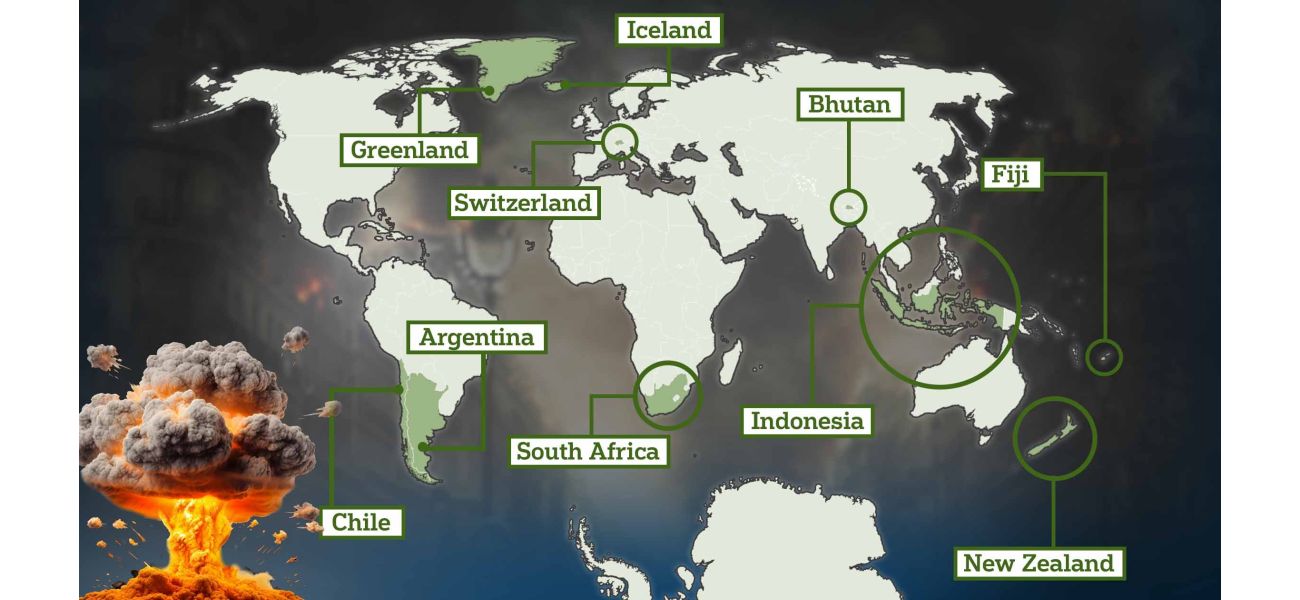A map displays the safest countries in the world during a potential World War III.
Concerns about Putin's potential actions have people thinking even the Arctic would be a better option.
November 22nd 2024.

In today's world, global tensions are at an all-time high due to an increase in nuclear threats from Russia. Many fear that this could lead to a catastrophic war between Russia and the West. President Vladimir Putin's recent statement about lowering the bar for nuclear strikes has only added to these concerns. Russia's nuclear doctrine has been updated to allow for the use of nuclear weapons in response to conventional attacks, and Putin has made it clear that the country is entitled to use these weapons against any country that allows their weapons to be used against Russian forces. This move has been seen as a direct threat to the United States and the United Kingdom, especially after Ukraine, with support from these countries, fired Western-supplied missiles into Russia.
The possibility of a "World War 3" scenario has caused widespread panic, but there are some parts of the world that may offer a safer haven. One such place is Antarctica, which sits at the southernmost point of the planet. Its remote location and vast size make it an ideal place for people to seek refuge in the event of a nuclear war. However, the harsh and freezing climate may not be suitable for everyone.
Iceland, on the other hand, has earned a reputation as one of the most peaceful countries in the world. It ranks at the top of the Global Peace Index, having never been involved in a full-scale war or invasion. The country has signed agreements with Ukraine, but its support is limited to financing and transportation. Its remote location would protect it from the effects of a conventional war in Europe, although there is a possibility of some fallout reaching its shores.
New Zealand also ranks high on the Global Peace Index and has taken a neutral stance on most conflicts. Its mountainous terrain provides natural protection for its citizens, and the country has provided financial support to Ukraine's military. However, it is highly unlikely to face any attacks in the event of a Western conflict with Russia.
Switzerland is often associated with political neutrality, even during World War Two. Its landlocked geography and numerous nuclear shelters make it a well-protected country. It has not provided assistance to Ukraine and has even been accused of favoring Russia, making it an unlikely target for Putin.
Greenland, the world's largest island, is politically and geographically neutral as it belongs to Denmark. Its small population and limited natural resources make it an unattractive target for any aggressor.
Indonesia, a country with a neutral foreign policy, has often taken a neutral stance on political issues. It acts independently in international affairs and prioritizes world peace. Tuvalu, located in the Pacific Ocean, is a small island with a weak infrastructure and few natural resources, making it an undesirable target for any aggressor.
Argentina has been engaged in conflicts in the past, but it is also one of the most likely places to survive a famine. The country has an abundance of crops, including wheat, which would provide a steady food supply even if the sun were blocked by nuclear dust.
Bhutan declared itself neutral in 1971 and has remained so ever since. Its landlocked geography and mountainous regions make it easier to defend, and its lack of clear military strategy and small army make it an unlikely target.
Chile, with its 4,000-mile-long coastline and diverse natural resources, is another country that could offer a higher chance of survival. Its modern infrastructure is considered the most advanced in South America, which could also increase the chances of survival for its citizens.
Fiji, located 2,700 miles away from its closest neighbor Australia, has a lack of clear military strategy and a small army, making it a peaceful and safe country. Its dense forests, minerals, and fishing spots could provide a sustainable food supply in the event of a nuclear war.
Lastly, South Africa has multiple sources of food, fertile land, and fresh water, making it an ideal place for survival. Its modern infrastructure could also increase the chances of survival as these resources are managed and efficiently distributed.
As tensions continue to rise between Russia and the West, these countries may offer a safer haven for those seeking to escape the potential devastation of a global nuclear war. However, it is important to remember that war and conflict are never the answer, and it is crucial for world leaders to prioritize peace and diplomacy in times of crisis.
The possibility of a "World War 3" scenario has caused widespread panic, but there are some parts of the world that may offer a safer haven. One such place is Antarctica, which sits at the southernmost point of the planet. Its remote location and vast size make it an ideal place for people to seek refuge in the event of a nuclear war. However, the harsh and freezing climate may not be suitable for everyone.
Iceland, on the other hand, has earned a reputation as one of the most peaceful countries in the world. It ranks at the top of the Global Peace Index, having never been involved in a full-scale war or invasion. The country has signed agreements with Ukraine, but its support is limited to financing and transportation. Its remote location would protect it from the effects of a conventional war in Europe, although there is a possibility of some fallout reaching its shores.
New Zealand also ranks high on the Global Peace Index and has taken a neutral stance on most conflicts. Its mountainous terrain provides natural protection for its citizens, and the country has provided financial support to Ukraine's military. However, it is highly unlikely to face any attacks in the event of a Western conflict with Russia.
Switzerland is often associated with political neutrality, even during World War Two. Its landlocked geography and numerous nuclear shelters make it a well-protected country. It has not provided assistance to Ukraine and has even been accused of favoring Russia, making it an unlikely target for Putin.
Greenland, the world's largest island, is politically and geographically neutral as it belongs to Denmark. Its small population and limited natural resources make it an unattractive target for any aggressor.
Indonesia, a country with a neutral foreign policy, has often taken a neutral stance on political issues. It acts independently in international affairs and prioritizes world peace. Tuvalu, located in the Pacific Ocean, is a small island with a weak infrastructure and few natural resources, making it an undesirable target for any aggressor.
Argentina has been engaged in conflicts in the past, but it is also one of the most likely places to survive a famine. The country has an abundance of crops, including wheat, which would provide a steady food supply even if the sun were blocked by nuclear dust.
Bhutan declared itself neutral in 1971 and has remained so ever since. Its landlocked geography and mountainous regions make it easier to defend, and its lack of clear military strategy and small army make it an unlikely target.
Chile, with its 4,000-mile-long coastline and diverse natural resources, is another country that could offer a higher chance of survival. Its modern infrastructure is considered the most advanced in South America, which could also increase the chances of survival for its citizens.
Fiji, located 2,700 miles away from its closest neighbor Australia, has a lack of clear military strategy and a small army, making it a peaceful and safe country. Its dense forests, minerals, and fishing spots could provide a sustainable food supply in the event of a nuclear war.
Lastly, South Africa has multiple sources of food, fertile land, and fresh water, making it an ideal place for survival. Its modern infrastructure could also increase the chances of survival as these resources are managed and efficiently distributed.
As tensions continue to rise between Russia and the West, these countries may offer a safer haven for those seeking to escape the potential devastation of a global nuclear war. However, it is important to remember that war and conflict are never the answer, and it is crucial for world leaders to prioritize peace and diplomacy in times of crisis.
[This article has been trending online recently and has been generated with AI. Your feed is customized.]
[Generative AI is experimental.]
0
0
Submit Comment





